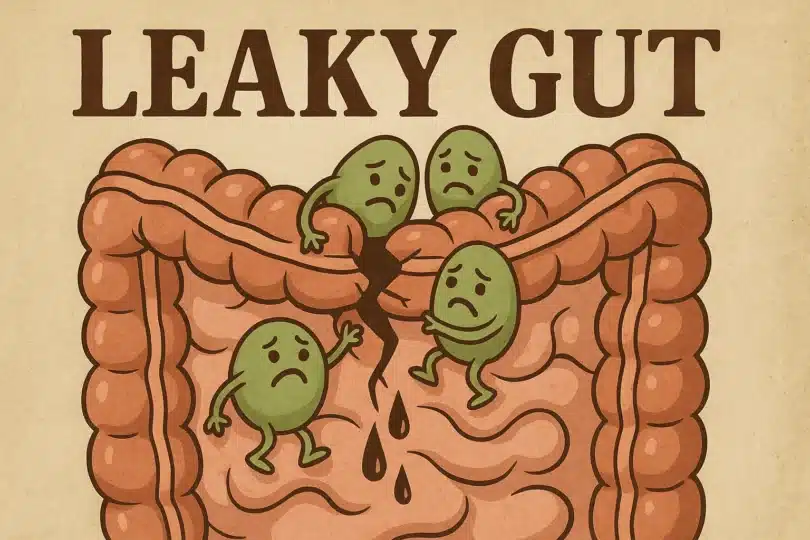Few topics in digestive wellness spark as much debate as “leaky gut”. Some health practitioners describe it as the root cause of countless conditions, while skeptics dismiss it as a vague, unproven concept. By 2025, science has made progress in clarifying the controversy. The medical term for leaky gut is increased intestinal permeability, a state where the gut lining becomes less effective at blocking harmful substances. This article explores what leaky gut is, what the evidence says, and whether natural remedies can help restore gut integrity.
What Is Leaky Gut?
The gut lining acts as a barrier, allowing nutrients to pass into the bloodstream while blocking toxins, bacteria, and undigested food particles. In leaky gut, the tight junctions between cells loosen, leading to increased permeability. This allows unwanted substances to “leak” into circulation, potentially triggering immune reactions and inflammation.
What Causes It?
- Poor diet: High sugar, processed foods, and alcohol damage the gut lining.
- Chronic stress: Stress hormones weaken barrier function.
- Medications: NSAIDs and antibiotics are known to affect gut permeability.
- Infections: Certain bacteria or parasites disrupt the intestinal wall.
- Imbalance in microbiome: Dysbiosis, or lack of microbial diversity, contributes to weakened gut barriers.
Leaky Gut and Disease
Research links increased intestinal permeability to conditions such as celiac disease, Crohn’s disease, and irritable bowel syndrome (IBS). Some studies suggest it may also play a role in autoimmune conditions, allergies, and even depression. However, scientists caution that leaky gut is not always a cause—it may also be a consequence of underlying disease. The relationship is complex, but the consensus is growing that gut barrier health matters for overall wellness.
Symptoms Often Associated with Leaky Gut
- Bloating and digestive discomfort
- Food sensitivities
- Fatigue and “brain fog”
- Joint pain or inflammation
- Skin issues like eczema or acne
These symptoms are nonspecific, which makes leaky gut hard to diagnose. Currently, no standard medical test exists, though researchers are developing biomarkers for intestinal permeability.
Natural Approaches to Gut Barrier Support
Dietary Changes
Eating whole, unprocessed foods with plenty of fiber supports microbial diversity. Eliminating ultra-processed foods, excess alcohol, and refined sugar helps reduce inflammation.
Probiotics and Prebiotics
These promote microbial balance, which strengthens the gut lining and reduces permeability.
L-Glutamine
An amino acid often used in supplements, glutamine helps repair intestinal lining and supports immune function.
Collagen
Collagen peptides may improve gut barrier integrity by supporting connective tissue in the gut lining.
Anti-inflammatory nutrients
Omega-3 fatty acids, zinc, and polyphenols from foods like berries and green tea help reduce gut inflammation.
Market Trends in 2025
“Gut barrier support” supplements have become a wellness category of their own. Products often include glutamine, collagen, probiotics, and anti-inflammatory botanicals. Affiliate programs in this niche are strong, with companies emphasizing gut restoration and immunity. Consumer demand is high, driven by rising awareness of digestive health’s role in energy, mood, and longevity.
Risks and Considerations
Because leaky gut lacks a formal medical diagnosis, consumers should be cautious of exaggerated claims. Supplements may help, but lifestyle factors—diet, stress, sleep—are equally important. People with chronic digestive symptoms should consult a healthcare professional to rule out underlying conditions.
Closing
Leaky gut sits at the intersection of science and wellness debate. While skeptics remain, mounting research supports the role of intestinal permeability in many health issues. In 2025, the safest path is a balanced approach: strengthen gut health with diet, probiotics, and targeted supplements while acknowledging that more research is needed. Whether cause or effect, supporting the gut barrier is a smart step toward better overall health.

